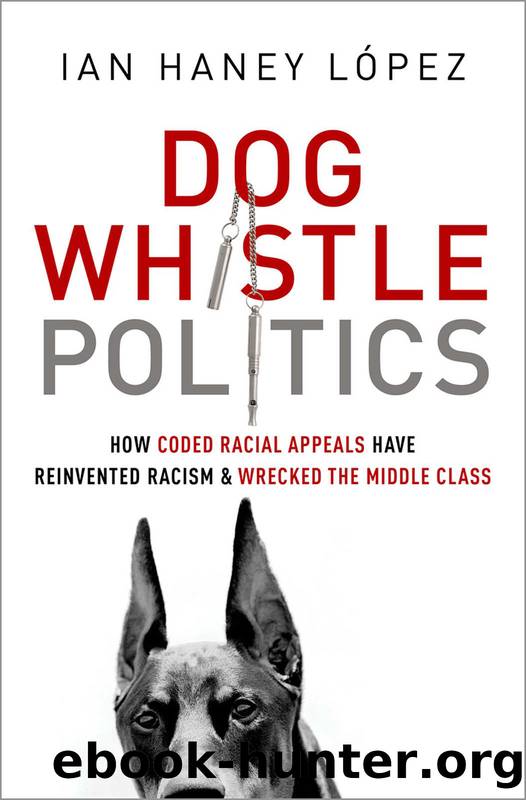Dog Whistle Politics by Ian Haney Lopez

Author:Ian Haney Lopez [Lopez, Ian Haney]
Language: eng
Format: azw3
Publisher: Oxford University Press
Published: 2013-12-11T16:00:00+00:00
âI GUESS IâM A RACISTâ
When Obama briefly referenced race as one of the ways that the GOP might try to scare voters, in addition to the typical ârace cardâ retort, the McCain camp also struck back with the charge that Obama had sought to âpaint John McCain ⦠as racist.â20 This assailment deserves a bit more attention.
The claim to have been slandered as a racist frequently crops up on the right in response to liberal efforts to focus on troubling racial dynamics, and there may be a fair level of cynical strategizing at work in such conservative carping. By translating the claim that race continues to play a distorting role in American life into a narrow indictment of mean-spirited bigotry, conservatives are more able to easily dismiss the allegation as absurd. The invented charge of being a closet Klan member is readily repudiated. In addition, because the charge of being a racist is freighted with social opprobrium, alleging they have been so charged allows conservatives to cast themselves as unfairly maligned victims. The claim to have been called a racist sucks all the air out of the room, ending any substantive conversation; the only thing left is for the race critic to apologize and to deny that she intended to call anyone a racist. In short, for conservatives, alleging that theyâve been called a racist is good strategy.
But what about the emotional affect that often accompanies this particular defensive kick? Typically, those claiming to have been denoted racists exude outrage or distress. The imagined accusation, their emotions communicate, has wounded them personally, deeply bruising their sense of themselves. McCainâs spokesperson reacted angrily, not only rejecting the non-charge but vigorously defending McCain as someone who âfought his entire life for equal rights for everyone,â as if McCainâs whole career had been smeared. Or consider the pained dismay communicated by actors in an ad opposing health care reform. The ad featured perhaps a dozen adults, mostly white and seemingly middle class, including one young woman with a toddler, looking directly into the camera to confess âI guess Iâm a racist.â21 The ad interspersed these aggrieved confessions with text and a voice-over repeating the allegation made by some outspoken liberals, including Jesse Jackson and Jimmy Carter, that race likely informed some of the opposition to Obamaâs health care overhaul. These actors were signaling their antagonism to health care reformâand also to the charge that in politics race mattersâby facetiously taking upon themselves the âracistâ label. Yet when they intoned âI guess Iâm a racist,â their demeanor communicated not satire but heart sickness.
Itâs impossible to know whether, coming from a politicianâs camp or an anti-health care ad, these intonations of wounded feelings were genuine or feigned. Even if the latter, though, they nevertheless track a real sense of distress among many conservatives, including many Tea Party members, who feel that they have been unfairly vilified as racists. Sometimes allegations of having been called a racist constitute a strategic retort, but often they reflect a deeply felt wound.
Download
This site does not store any files on its server. We only index and link to content provided by other sites. Please contact the content providers to delete copyright contents if any and email us, we'll remove relevant links or contents immediately.
| Elections & Political Process | Ideologies & Doctrines |
| International & World Politics | Political Science |
| Public Affairs & Policy | Specific Topics |
| United States |
The Secret History by Donna Tartt(16606)
The Social Justice Warrior Handbook by Lisa De Pasquale(11485)
Thirteen Reasons Why by Jay Asher(7777)
This Is How You Lose Her by Junot Diaz(5747)
Weapons of Math Destruction by Cathy O'Neil(5027)
Zero to One by Peter Thiel(4815)
The Myth of the Strong Leader by Archie Brown(4783)
Promise Me, Dad by Joe Biden(4439)
Stone's Rules by Roger Stone(4409)
Beartown by Fredrik Backman(4399)
How Democracies Die by Steven Levitsky & Daniel Ziblatt(4391)
The Fire Next Time by James Baldwin(4336)
100 Deadly Skills by Clint Emerson(4069)
A Higher Loyalty: Truth, Lies, and Leadership by James Comey(4024)
Rise and Kill First by Ronen Bergman(4007)
The David Icke Guide to the Global Conspiracy (and how to end it) by David Icke(3874)
The Farm by Tom Rob Smith(3868)
Secrecy World by Jake Bernstein(3773)
The Doomsday Machine by Daniel Ellsberg(3725)
